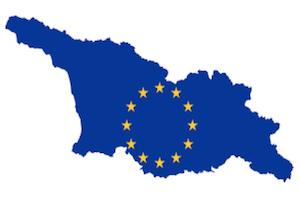
BACKGROUND: With or without a deal, the United Kingdom (UK) is set to leave the European Union (EU) in 2019. Brexit will have far-reaching consequences, not only for the UK and the EU but also for the EU’s neighboring countries.
For Georgia, the star pupil of the EU’s Eastern Partnership, Brexit coincides with the end of an era in EU-Georgia relations, after the country concluded a visa liberalization dialogue in 2017 and an Association Agreement, including a Deep Comprehensive Free Trade Agreement (AA/DCFTA), went into force in 2016.
The implementation of the AA/DCFTA will sustain Georgia’s reform efforts and further its relationship with the EU in the years to come. Yet, with the potential benefits of the Eastern Partnership now exhausted, Georgia has been keen to determine new perspectives on further integration. Several suggestions beyond the Eastern Partnership but short of EU membership have been made, such as a multispeed EaP with new instruments for more flexible integration, including accession to EEA (EaP+).
Georgian government officials worry that Brexit, and a subsequent period of reflection within the EU on how to move forward, could mean a further delay to Georgia’s hopes for EU membership. Meanwhile, they fear that a lack of immediate, tangible benefits from the AA/DCFTA may undermine domestic support for reforms. For now, the Georgian population remains overwhelmingly supportive of the Georgian government’s stated goal of joining the EU.
IMPLICATIONS: In the short-term, the UK’s departure from the EU will likely weaken the EU’s sanction regime towards Russia. The UK has been one of the most vocal critics of Russian aggression in the EU’s neighboring countries such as Georgia. A more Franco-German dominated bloc is likely to take a softer stance on Russia. Tbilisi would not welcome such a move, since EU sanctions on Russia serve to curb further Russian aggression in the region.
In the long-term, with the UK out, Georgia loses an advocate for enlargement, as France and Germany will take the lead on post-Brexit reforms. While the EU may well pursue deeper integration under their leadership, for example on defense and security co-operation, migration, and the Eurozone, few expect significant changes to its neighborhood and enlargement policy.
French President Macron’s Sorbonne speech in September last year on Europe’s future was notably void of any references to Europe’s eastern neighborhood. Its strategic interests in Europe’s neighborhood traditionally focus on the south, from which migration and terrorism have posed significant threats. Macron’s silence is illustrative of France’s conservative thinking on enlargement, but also reflects a more profound choice to focus on rebuilding the EU from the inside first.
Germany has traditionally been a driver of Eastern EU enlargement. Merkel, as recently as last summer, has stressed the EU should keep the door open to further enlargement, but German officials have made clear that the ENP is no instrument of enlargement policy. Crucially, Germany has refused to give frontrunners such as Georgia additional incentives to stick to their reform path.
Today, prospects of EU membership for Georgia remain as slim as they were before the 2016 Brexit vote. Possible improvements short of a membership perspective are currently also not on the table. A proposal from the European Parliament for an EAP+ model for Georgia, Ukraine and Moldova, for example, was not discussed at the most recent EAP summit in November where leaders outline future cooperation. While Georgia can do little to influence the unfolding shifts within the EU, there are number of actions it can take to advance its Euro-Atlantic integration.
First, Georgia should remain steadfast in its efforts to implement reforms associated with the AA/DCFTA. Making effective use of the AA/DCFTA will further its functional EU integration, and could eventually lead to EEA accession. This is not wishful thinking: the EU’s Global Security Strategy explicitly mentions “creating an economic area with countries implementing Deep and Comprehensive Free trade Areas.” A regional free trade area among EaP frontrunners, including Georgia, could be a first step in that direction.
Second, Georgia should aim to establish security and defense co-operation with the EU. When the UK leaves, the EU loses a key veto player on security and defense co-operation, although there will also be much less capacity available for EU operations without the UK. The EU has taken cautious steps towards a European Security and Defense Union under French-German leadership even though longstanding differences remain. ESDU association would first require the conclusion of an administrative agreement with the European Defense Agency.
Third, Georgia should carefully monitor public perceptions of EU reform. While support for EU integration remains high, many of its policies remain misunderstood. Over the past few years in particular, Russia has intensified its efforts to undermine the EU and misrepresent its policies through a subtle but effective disinformation campaign that exploits its more professional media and influence over local information sources. Engaging with the public on Europe and its perceptions towards Georgia is crucial to ensure there is no public backlash against EU integration.
CONCLUSIONS: The lack of deeper integration with the EU under French-German leadership post-Brexit will undoubtedly not please Tbilisi, which prefers a clear roadmap on how to move forward towards EU membership at a time when public and elite attitudes are at risk of eroding and Russia’s retaliation continues to loom.
To advance its Euro-Atlantic integration it should temper its expectations and focus on implementing reforms associated with the AA/DCFTA. New incentives, however much needed, cannot replace Georgia’s willingness to pursue sustainable reforms. Rather than faint and distant membership perspectives, Georgia needs its government to commit to its democratic development to create the necessary conditions for potential membership negotiations.
AUTHOR’S BIO: Casper Wuite is a political analyst located in Georgia. Previously, he worked on (EU) foreign and security policy for the European Union, the Dutch Ministry of Foreign Affairs and the Lowy Institute, an international think tank. He holds an MSc degree in Politics and Government from the London School of Economics.
Image source: By: Public Domain via Wikimedia, accessed on 5.8. 2018



